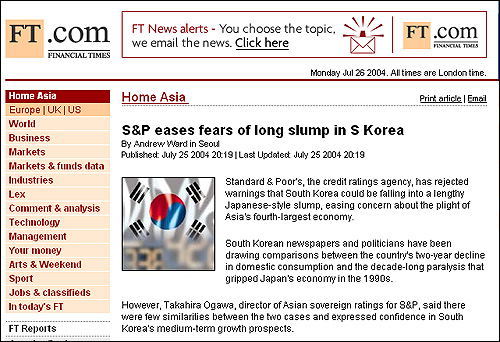|
 | | | ▲ 26일자 파이낸셜타임스 인터넷판 기사. 파이낸셜타임스는 S&P 관계자의 평가를 인용해 한국경제가 일본식 장기침체로 빠져들 가능성은 적다고 보도했다. | | | |
한국언론의 '호들갑'이 문제일까, 외국 신용평가기관의 '낙관론'이 문제일까.
세계적인 신용평가회사인 스탠다드앤드푸어스(S&P)가 "한국이 일본식 장기불황에 빠질 위험에 직면해 있다"고 보도한 한국 언론, 특히 <중앙일보>의 관측을 정면 반박하고 나서 관심을 모으고 있다.
최근까지 '경제위기론'을 퍼뜨려왔던 <중앙일보>는 한국경제가 일본식 장기불황에 빠질 위험에 매우 높다고 경고하는 사설과 칼럼을 지난 20∼22일 사이에 잇달아 내보낸 바 있다.
지난 20일 <중앙일보>에 게재된 '이미 시작된 일본식 장기불황'이라는 제목의 '이장규칼럼'은 "여차직하면 일본식 10년 불황이 아니라 남미경제의 전철을 밟을지도 모를 지경인데도 '경제위기론'이나 '장기불황론'을 꺼내면 개혁의 반동분자로 모는 분위기니 딱한 노릇"이라고 평한 뒤 정부의 안이한 인식을 거세게 질타하기도 했다.
파이낸셜타임스는 26일 'S&P, 한국의 장기침체에 관한 우려 덜어주다'라는 제목의 기사에서 "한국 신문들과 정치인들은 2년에 걸친 내수침체와 1990년대 10여년간 지속된 일본의 경제마비상태를 비교해왔다"면서 그러나 "S&P의 다카히라 오가와 아시아 국가신용등급 담당이사는 두 나라 사이에 유사점은 거의 없고 한국의 중기 성장전망은 밝다고 밝혔다"고 보도했다.
또한 다카히라 오가와 이사는 "한국은 1990년대의 일본처럼 자산가격이 폭락에 시달리지 않았으며 한국의 은행들은 일본의 은행들처럼 많은 부실여신이 쌓여있는 것도 아니다"라고 진단했다.
특히 파이낸셜타임스는 지난 21일자 <중앙일보>의 칼럼을 직접 인용하며 "다카히라 오가와 이사의 이러한 낙관적 평가는 <중앙일보>의 보도와는 대조를 이룬다"고 강조하기도 했다.
<중앙> "남미경제의 전철을 밟을지도 모를 지경" 보도
파이년셜타임스에 따르면 <중앙일보>는 당시 칼럼을 통해 "한국경제는 일본식 장기불황에 직면할 위기 혹은 남미식 경제처럼 붕괴할 위기 상황에까지 놓여있다"고 보도했다.
S&P의 이러한 평가는 한국경제의 일본식 장기불황 추락 우려를 수차례 재생산하고 있는 일부 한국 언론의 전망과는 대조적인 것으로, "한국 언론이 오히려 과도하게 불안심리를 부추기고 있다"는 지적을 낳을 것으로 보인다.
하지만 파이낸셜타임스는 "한국 경제는 지난해 소비자 신용의 거품이 붕괴되면서 수많은 가계가 빚더미로 내몰린 이후 허우적대고 있다"고 지적하고 "강력한 수출이 내수침체를 상쇄하고 있지만 일부 애널리스트들은 중국발 수요 감소세와 불황으로 빠져들 수도 있는 미국의 상황을 우려하고 있다"고 전했다.
아울러 "노동임금 상승과 급속도로 진행되고 있는 인구 고령화 등도 경쟁력에 대한 장기적 위협이 되고 있다"면서 "좌파적인(left-leaning) 대통령인 노무현 정부의 경제 정책에 대한 불확실성도 또다른 우려의 요인이 되고 있다"고 보도하기도 했다.
파이낸셜타임스는 또 "2년전 한국은 아시아에서 가장 경제성적이 좋은 나라 중 하나였던 데 비해 일본은 침체의 종착점에 이른 것처럼 보였다"면서 "당시 논평가들은 어떻게 한국이 이웃 부국을 따라 잡을 수 있는가를 얘기하고 한국이 금융위기 후 부실여신을 깨끗이 정리한 사례를 일본이 배우도록 촉구했다"고 한 뒤 "그런데 요즈음에는 한국의 언론들이 어떻게 한국이 일본의 경제회복을 모방할 수 있는 지를 논하고 있다"고 비꼬았다.
파이낸셜타임스는 "한국은 지난 3년간 연 평균 4.2%의 경제성장률로 경제협력개발기구(OECD) 회원국 가운데 가장 높은 성장세를 기록했다"며 "올해 성장률 목표는 5.2%이지만 지난 40여년 중 대부분 두자릿수 성장률을 구가해왔던 나라로서는 상대적으로 낮은 수준"이라고 전했다.
도미니크 드워 프리코 '바클레이스 캐피털' 연구원은 "한국이 비교적 오래 가는 침체에 빠졌다"면서도 "일본과의 비교는 웃기는 소리"라고 일축하기도 했다. 그는 "한국은 일본이 1980년대 말에 직면했던 상황 근처에도 가지 않았다"고 말했다.
다음은 파이낸셜타임스의 기사 전문이다.
S&P eases fears of long slump in S Korea
Standard & Poor's, the credit ratings agency, has rejected warnings that South Korea could be falling into a lengthy Japanese-style slump, easing concern about the plight of Asia's fourth-largest economy.
South Korean newspapers and politicians have been drawing comparisons between the country's two-year decline in domestic consumption and the decade-long paralysis that gripped Japan's economy in the 1990s.
However, Takahira Ogawa, director of Asian sovereign ratings for S&P, said there were few similarities between the two cases and expressed confidence in South Korea's medium-term growth prospects.
South Korea had not suffered as big a decline in asset prices as Japan in the 1990s and South Korean banks were not lumbered with as many non-performing corporate loans as their Japanese counterparts, he said.
The comments came as S&P reaffirmed its "A-" rating and stable outlook on South Korea's foreign debt.
Mr Ogawa's sanguine assessment contrasted with panicky comment in the local press. A column in Wednesday's JoongAng Ilbo newspaper said: "We are at risk of facing a decade-long recession like Japan or even an economic collapse as the South American economies experienced."
South Korea's economy has been struggling since the bursting of a consumer credit bubble last year left households mired in debt. Strong exports have so far compensated for the slump in domestic consumption but some analysts fear slowing demand from China and the US could tip the economy into recession.
Longer-term threats to competitiveness include rising labour costs and a rapidly ageing population. Uncertainty about the economic policies of Roh Moo-hyun, the country's left-leaning president, is another source of anxiety.
South Korea's economic malaise has coincided with recovery in the Japanese economy. This represents a reversal from two years ago, when South Korea was one of the best-performing economies in Asia and Japan appeared in terminal decline. At that time, commentators talked of how South Korea was catching up with its wealthier neighbour and urged Japan to learn from Korea's clean-up of non-performing corporate loans following the Asian financial crisis.
Today, South Korean newspapers discuss how the country can emulate Japan's recovery.
Koreans feel an intense rivalry with their eastern neighbour because their country was occupied by Japan from 1910 to 1945. The desire to close the wealth gap with Japan is reinforced by the need to stay ahead of China's fast-developing economy to the west.
South Korea has the highest trend growth rate among members of the Organisation for Economic Co-operation and Development, its economy having expanded by an average 4.2 per cent for the past three years. This year's target is 5.2 per cent. However, these are relatively low numbers for a country that enjoyed double-digit growth throughout much of the past four decades.
Dominique Dwor-Frecaut, economist at Barclays Capital, said South Korea was stuck in a protracted slowdown but dismissed the comparison with Japan as "ludicrous". "Korea is nowhere near where Japan was at the end of the 1980s," she said.
|
|
저작권자(c) 오마이뉴스(시민기자), 무단 전재 및 재배포 금지
오탈자 신고